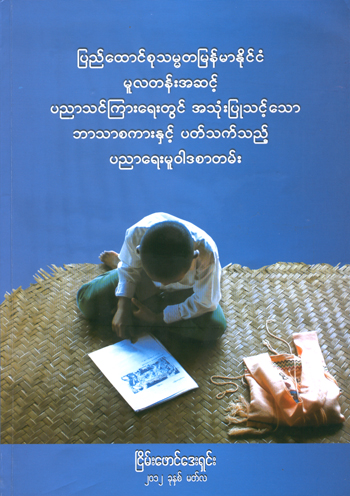If the government fears opening up non-Burman classes in elementary schools may undermine the importance of the dominant Burman language, it needs not, says a report published in March by Shalom Foundation, a registered NGO in Burma.
 Copies of the report, “Policy paper on ethnic language teaching in elementary lower level” have been presented to all the ethnic members of Parliament in the country’s 3 tiered legislature: local, lower and upper, according to a co-author. “We are urging them to keep pushing for parliamentary resolution allowing ethnic languages to be taught at elementary / lower level (kindergarten, grade 1 and grade 2),” he said.
Copies of the report, “Policy paper on ethnic language teaching in elementary lower level” have been presented to all the ethnic members of Parliament in the country’s 3 tiered legislature: local, lower and upper, according to a co-author. “We are urging them to keep pushing for parliamentary resolution allowing ethnic languages to be taught at elementary / lower level (kindergarten, grade 1 and grade 2),” he said.
U Myo Aye, education minister, announced on 15 June that non-Burman languages would be permitted to be taught outside school hours at the elementary lower level.
The report, based on its survey last year, argues that allowing children to learn the basics in their own mother tongue will serve as a bridge toward successful learning in the national language, which is Burmese. “It (learning in official language right from the first day in school) may be one of the principal reasons why there are so many dropouts,” it says. “Building a strong foundation in L1 (first language) helps L2 (second language) learning much more than early or long exposure to L2.”
In fact, several neighboring countries have already been adopting a bi-lingual (official and local language) system, says the report. Cambodia, China, Thailand and Vietnam have been given as examples.
In Cambodia, the following system is being implemented:
| Grade 1 | Grade 2 | Grade 3 | Grade 4 | |
| Mother tongue | 80% | 60% | 30% | 0% |
| Khmer | 20% | 40% | 70% | 100% |
The research found that only 7% of grade 1 students and 3% of grade 2 students had achieved average level understanding of the paragraph they had read. The rest were all under average.
In elementary upper level only 6% (Grade 3) and 17% (Grade 4) had achieved average and over-average level in recounting the content they had read in sequence.
The report recommended the mother tongue should be the teaching foundation for elementary lower level and gradual increase in teaching Burmese from elementary upper level. It also urges, among others, the government to appoint teachers who are bilingual (Burmese and local) in ethnic areas.
The report was based on the field research carried out in 2011 in 6 states: Arakan, Chin, Kachin, Karen, Mon and Shan. “We wanted to go to Kayah (Karenni) too,” explained a researcher. “But security concerns forced us to turn back.”
The ceasefire agreement between the anti-Naypyitaw Karenni National Progressive Party (KNPP) and the government was signed on 7 March.
The Shalom Foundation, also known as Nyein (Peace), was formed in 2000 under the leadership of Dr Saboi Jum.



